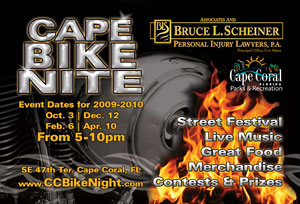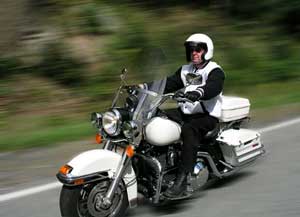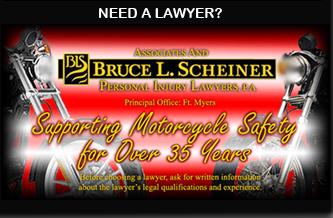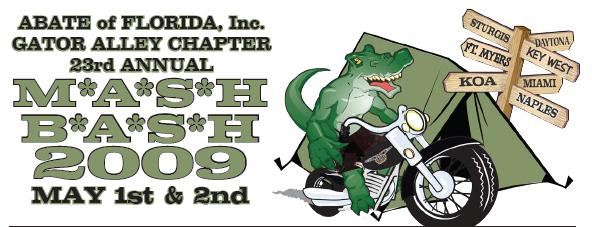Well as it turns out, plenty.
Curbing a Trend
Here at the
Well as it turns out, plenty.
Curbing a Trend
Here at the
 Everything a motorcycle does relies on that little patch of rubber that meets the road. If your tires are not in peak condition, your motorcycle can’t steer, stop or accelerate as it should. Yet, the generally lack of concern over tires is mind-boggling.
Everything a motorcycle does relies on that little patch of rubber that meets the road. If your tires are not in peak condition, your motorcycle can’t steer, stop or accelerate as it should. Yet, the generally lack of concern over tires is mind-boggling.
Two items that should be checked on a regular basis are tire inflation and tread depth. Ideally, tires should be checked prior to every ride; but, at the least, they should be checked every week. A tire doesn’t have to deflate entirely to get you in trouble. An under inflated tire decreases stability, limits traction and has increased possibilities to complete failure…a blowout! An over inflated tire decreases traction and, of course, it wears much faster. Check your owner’s manual to find the right PSI (pounds per square inch) of air pressure for your tires. Keep in mind that these recommendations are usually dependent upon the weight of you and your passenger, as well as any cargo. Some manufacturers advise adding 3 or 4 PSI when carrying a heavy load. Know your vehicle weight and load, and follow the recommendations specific to your motorcycle.
As with tire pressure, it only takes a few minutes to check your tires for excessive or irregular wear, punctures, cracks, cuts, and often overlooked…tread groove cracking. Every time you ride is not too often to check your lifeline to the road. If you don’t have a way to raise your bike off the ground, have someone roll the bike for you to inspect the tires.
 Southwest Florida’s largest bike night draws riders from all over, including Fort Myers, Cape Coral, Bonita Springs, Lehigh Acres, Punta Gorda and Port Charlotte.
Southwest Florida’s largest bike night draws riders from all over, including Fort Myers, Cape Coral, Bonita Springs, Lehigh Acres, Punta Gorda and Port Charlotte.
Primary sponsor, Associates and Bruce L. Scheiner, Personal Injury Lawyers, has been a supporter of motorcycle rights and organizations in Florida for four decades and represents motorcyclists throughout Florida who have been injured or killed in motorcycle accidents. The firm also publishes the website www.flbikers.com, dedicated to motorcycle riding in Southwest Florida.
“We look forward to promoting safety and awareness throughout the upcoming season,” Bruce L. Scheiner said.
On July 30, 2009, the motorcycling community lost one of the most recognizable names in the industry. Bruce Rossmeyer, the largest Harley-Davidson dealer in the World, died at 66 years of age due to injuries suffered in a motorcycle accident in Wyoming. In route to the 69th Annual Sturgis, SD Motorcycle Rally from the Harley-Davidson Summer Dealer Meeting in Denver, CO he was traveling with five friends on a two lane road in a remote area of Wyoming.
According to the Wyoming Highway Patrol report: “They were trailing a Ford pickup pulling a double axle camper-style trailer. The truck driver, Robert L. VanValkenburg, 73, of Rock Springs, WY, slowed down and began making a left turn when Rossmeyer tried to pass him. Rossmeyer, who was not wearing a helmet, struck the driver’s-side door. VanValkenburg’s turn signals and brake lights were working at the time of the crash.”
This is a tragic loss. Perhaps too early to discuss so soon after his death; but, it does present an opportunity to look at what can be learned from this accident. This isn’t about helmets or no helmets. And, it isn’t about placing blame on either party to the accident. It is about how to avoid situations because as riders we are ultimately responsible for our own safety.
 Riding a motorcycle is a form of personal freedom, but can be dangerous. According to the National Highway Traffic Safety Administration, motorcyclists are 37 times more likely than car occupants to die in a traffic accident. Whether motorcycling across town or across country, use the following tips to help stay safe:
Riding a motorcycle is a form of personal freedom, but can be dangerous. According to the National Highway Traffic Safety Administration, motorcyclists are 37 times more likely than car occupants to die in a traffic accident. Whether motorcycling across town or across country, use the following tips to help stay safe:
Slow Down
Give yourself more time to avert obstacles like animals, road debris, children, or pedestrians in the road. Be better prepared to stop when a teenager or drunk driver ignores a stop sign. Cornering on sandy pavement is treacherous if you’re riding too fast.

Florida injury lawyers is posting the Top 10 lethal driving mistakes, as compiled by MSN Autos, to remind motorists that safe driving habits are the best defense to prevent you or a loved one from being seriously injured or killed in a car accident or other traffic fatality.
Nationwide, 37,313 died in traffic crashes in 2008 — more than 1,200 in Florida. Traffic accidents are the leading cause of death for young people ages 15 to 24.
Swerving: The No. 1 mistake drivers make is not staying in their own lane, running off the road, or drifting into another lane. According to the National Highway Traffic Safety Administration, more than 15,000 people were killed in crashes in 2007 as a result of a driver who didn’t stay in the proper lane.
Driving Drowsy: The NHTSA estimates more than 1,400 people were killed in traffic crashes in 2007 as a result of driver fatigue. Visit www.drowsydriving.org for more information.
Drinking and Driving: Every 40 minutes someone dies in a drunk-driving accident. Young drivers ages 21 to 34 are responsible for well over half of alcohol-related fatalities. According to the NHTSA, 60 percent of drivers who died after dark in 2007 were legally drunk. Alcohol is also a factor in half of pedestrian traffic deaths — both drivers and pedestrians are culprits.
Overcorrecting: More than 4 percent of automobile fatalities occur because of driver overcorrecting, particularly while behind the wheel of an SUV driving on the highway at high speeds.
Speeding: Speeding is the second-highest cause of death in fatal crashes, according to the NHTSA. Thirty percent of fatalities occur at 55 mph or above. The worst case scenario is speeding without a seat belt or motorcycle helmet. Fatality rates for speeding motorcyclists are shockingly high — 36 percent of motorcycle fatalities were caused by speed in 2007.
Failure to Yield the Right of Way: For drivers over the age of 70, failure to yield is the top cause of crashes. The Insurance Institute for Highway Safety reports drivers over 80 simply fail to see the vehicle, while drivers 70 to 79 misjudge the time and distance. Failure to yield the right of way was the 5th leading cause of fatal crashes in 2007.
Erratic or Reckless Driving: More than 1,850 fatalities in 2007 were the result of reckless driving, including weaving, tailgating, exceeding the speed limit by more than 20 mph or doing more than 80 mph.
Running red lights: Three out of every four automobile accidents occur in cities — the most common cause is hitting the gas when the light turns red.
Not Wearing a Seat Belt: Despite the fact that wearing a seat belt is far more prevalent than even a decade ago — not to mention legally required — one-third of traffic fatalities result from unbuckled occupants. Without a seat belt, car drivers and passengers put themselves at risk of being ejected and 76 percent of the time ejection results in death.
Inattentive Driving:
Eating, talking on a cell phone, text messaging and fumbling with the car stereo all result in inattentive driving, which was responsible for 4,704 deaths in 2007. Talking on the cell phone has become the number one bad habit, with an estimated 1 million drivers talking on the phone at any given time and an increasing number of states, including Florida, considering outlawing the practice.
Continue reading ›

Florida injury lawyers urge bikers and motorists to review safe driving habits to help prevent motorcycle accidents and fatalities as Florida proclaims May to be Motorcycle Safety Awareness Month.
“Motorcycling is a year-round activity in Florida and Motorcycle Safety Awareness Month does not come around often enough,” said Bruce L. Scheiner, founder and senior attorney at Associates and Bruce L. Scheiner, Personal Injury Lawyers, which has been fighting for motorcycle rights and representing motorcyclists injured or killed in Florida motorcycle accidents since 1971. “Motorcycle crashes are always very serious and are most often not the fault of the biker. We urge all motorists to watch out for motorcycle riders and wish everyone a long summer of safe riding.”
Research shows that motorcyclists are about 37 times more likely than a car occupant to die in a traffic crash. Between 2002 and 2007, U.S. motorcycle fatalities increased by 57 percent, from 3,276 to 5,154. There were 103,000 motorcyclists injured in 2007.
In Florida, motorcyclists account for 6 percent of the motoring public, yet account for 17 percent of all traffic fatalities.
“Motorcyclists are much more vulnerable than other motorists in the event of a crash,” said Colonel Chris Knight, director of the Florida Highway Patrol. “Research shows that approximately 80 percent of motorcycle crashes injure or kill the motorcycle rider.”

Safety Tips
* Remember motorcycles are vehicles with all the rights and privileges of any vehicle on the road. Always allow a motorcycle a full lane — never try to share a lane.
* Motorcyclists should never ride between lanes of slow moving or stopped traffic.
* Always make a visual check for motorcycles by checking mirrors and blind spots before entering or leaving a lane of traffic and at intersections.
* Motorcyclists should assume they are invisible to other motorists and operate their motorcycle accordingly. Position yourself to be seen.
* Always signal your intentions before changing lanes or merging into traffic.
* Don’t be fooled by flashing turn signals on any vehicle. Be aware that motorcycle signals are often not self-canceling and riders sometimes forget to turn them off. Wait to make sure the motorcycle is going to turn before you proceed.
* Remember that road conditions which may be minor annoyances to passenger vehicles can pose major hazards to motorcyclists.
* Allow for sufficient following distances. When following a motorcycle, make certain the motorcyclist has enough time to maneuver or stop in an emergency. Never tailgate.
* Motorcyclists should know and obey traffic laws, be alert to other drivers, never drink and ride and always wear protective gear.
“All too often after a crash, the drivers of other vehicles involved say they never saw the motorcyclist and were unable to respond in time,” the Florida Department of Highway Safety and Motor Vehicles said in proclaiming safety month. “This is no excuse. Too many lives are being lost. The message to all driver is: make this the first year in recent years when motorcycle fatalities do not increase. Remeber that May is Motorcycle Safety Month. Do your part — share the road with motorcycles.”
Continue reading ›

Motorcycle riders from across Southwest Florida will ride into Naples for this weekend’s MASH BASH, sponsored in part by Associates and Bruce L. Scheiner, Personal Injury Lawyers.
“We are excited to join all of our friends in Collier County for this weekend’s motorcycle event,” said Founder and Senior Attorney Bruce L. Scheiner. “Promoting motorcycle safety and awareness, preventing motorcycle accidents and fighting for the rights of injured bikers has been one of our firm’s primary goals for 38 years.”
The 23rd annual MASH BASH, hosted by the ABATE of Florida Gator Alley Chapter, is Saturday and Sunday May 1 and 2 at the KOA Campground, 1700 Barefoot Williams Road, Naples.
Gate fees are $10 Friday Night, $15 Saturday ($10 after 8 p.m.) or $20 for the weekend. Children under 12 are free (8p.m. curfew for minors). Gates open Friday at 5 p.m.
There will be a live radio remote by 96.1 K-rock and live music by Tantrum on Friday night as well as live bands all day Saturday, including Well Hungarians, Red Ball Jets and West Coast South.
Events include a 50/50 raffle and prizes, food and beverage vendors, bike show, bike games kids’ activities, clothing and other vendors, tattoo contest and veterans’ recognition presentation.
A limited number of primitive tent and camping sites are available free of charge to bikers. Full service sites also are available.
The event benefits ABATE’s legislative efforts for motorcycle rights in Tallahassee. For more information contact Jim Kalvin, 239-280-6054; Heidi Yahl 239-455-5767; Paul Evans 239-961-1414 or visit www.gatoralley.net.
Continue reading ›

A pair of serious Cape Coral motorcycle crashes killed one man and seriously injured two others over the weekend. Florida injury lawyers remind motorists to use extra caution around motorcycles in an effort to avoid the tragic consequences that too often result from motorcycle accidents.
Ronald L. Johnson, 53, of Cape Coral, died Friday night from injuries suffered after his Harley-Davidson motorcycle was struck from behind by a car, according to a report in The News-Press. Johnson had slowed his motorcycle for a yellow light on Del Prado when the car behind him failed to stop.
The impact threw Johnson from his motorcycle. The newspaper said Johnson’s death was the second fatality in Cape Coral this year — both fatalities were the result of motorcycle accidents.
Two other Cape Coral residents were injured in a Sunday night crash on Pine Island Road. A 20-year-old man was taken to Lee Memorial Hospital with life threatening injuries. His 18-year-old passenger was seriously injured after their motorcycle was struck by a passing car driven by a 16-year-old girl.
Please remember to share the road with our local motorcycle riders so they can return home safely to their families. The National Highway Traffic Safety Administration urges motorists to keep in mind the following safety tips:
Respect the motorcyclist: Give the motorcycle a full lane to travel and remember motorcycles have all the rights and privileges of any vehicle on the roadway.
Look Out: Look out for motorcycles on the roadway, at intersections, and when a motorcycle may be signaling a left-hand turn. Clearly signal your intentions.
Anticipate a motorcycle’s maneuvers: Predict evasive actions. Potholes and debris you may ignore could be deadly to a motorcyclist.
Allow plenty of space: Don’t follow a motorcycle too closely. Allow plenty of room.
While any traffic accident can be serious, getting into an accident with a motorcyclist is often deadly. Give them plenty of room and yourself plenty of time to react — it’s in everyone’s best interest.
Continue reading ›

Finding a personal injury or wrongful death attorney that goes the extra mile for clients can make a big difference if your or a loved one are seeking compensation as a result of a car accident, motorcycle accident, trucking accident or other Florida personal injury case.
Trial attorneys at Associates and Bruce L. Scheiner, Personal Injury Lawyers, spent the weekend working with a focus group to fine tune strategy for an upcoming trial.
“We do it to try to forecast and predict the feelings of the potential jury. It helps us to understand how to better present our case so that we can cover the issues that are important to the jury,” said Bruce L. Scheiner, founder and senior attorney at Associates and Bruce L. Scheiner, Personal Injury Lawyers. “It gives you excellent insight into the issues that are in people’s minds that you might not otherwise consider.”
Attorney Preston Scheiner said convening such groups during trial preparation is another way the firm ensures clients are getting the best representation the firm’s four decades of experience can provide.
Fourteen Southwest Florida residents recruited at random, through churches and other organizations, were brought together at an off-site location in Fort Myers to hear the case.

Lunch was provided to the participants, who received a small stipend, but the names of the firm, the attorneys and the client were withheld so that verdicts and opinions could be formed free from any associated bias or influence.
The event was filmed and each of the 14 mock jurors was asked to complete a form and offer input at various stages of the proceedings. They were then split into two groups for deliberations and separate verdicts.
“You learn an incredible amount because you step outside the looking glass and you see the facts from a different perspective,” Attorney Preston Scheiner said. “You also come to understand how opinions in the community can come to bear on a particular case.”
The event also provided an opportunity to help educate the public about the trial process, the challenges of helping someone through a personal injury claim and the benefits of finding a qualified firm to protect their rights.
“Thanks so much for the opportunity — it was awesome,” one participant wrote to an event organizer. “Never had I experienced anything like that before. Please consider me again next time — I would love to be a part of it.”
Continue reading ›